Sweetening without sugar - popular alternatives
Almost all the food we eat every day contains sugar. Although most people know that sugar can cause various diseases as well as obesity and tooth decay, they often find it very difficult to give it up.
Not least because they have not yet found a suitable alternative that sweetens food and drinks sufficiently. This should now come to an end.
Why is sugar unhealthy?
Excessive sugar consumption can cause symptoms such as listlessness, fatigue, stomach and intestinal problems, hair loss, lack of energy, sleep and concentration problems, but also nervousness.
Because sugar fats our liver and cannot detoxify our body properly, blood levels rise and we gain weight. A chronically high insulin level cannot be ruled out if sugar consumption is permanently high.
This can have a pro-inflammatory effect and cause chronic diseases. However, there are differences in sugar.
While common household sugar is very harmful to the human organism, natural sugar such as fructose is much healthier and plays a particularly important role for the body in obtaining energy.
It is not only the brain that needs sugar to remain functional, but also the muscles and our metabolism.
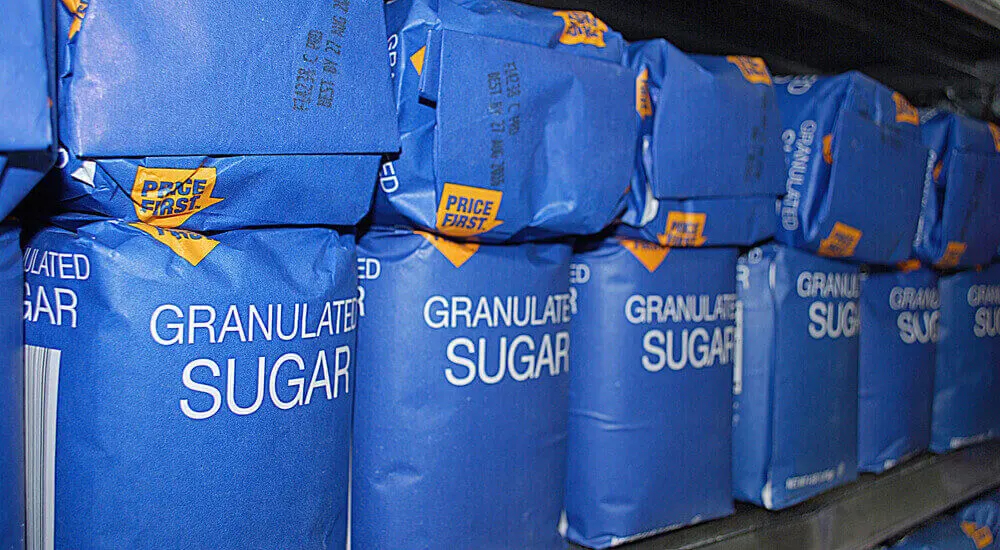
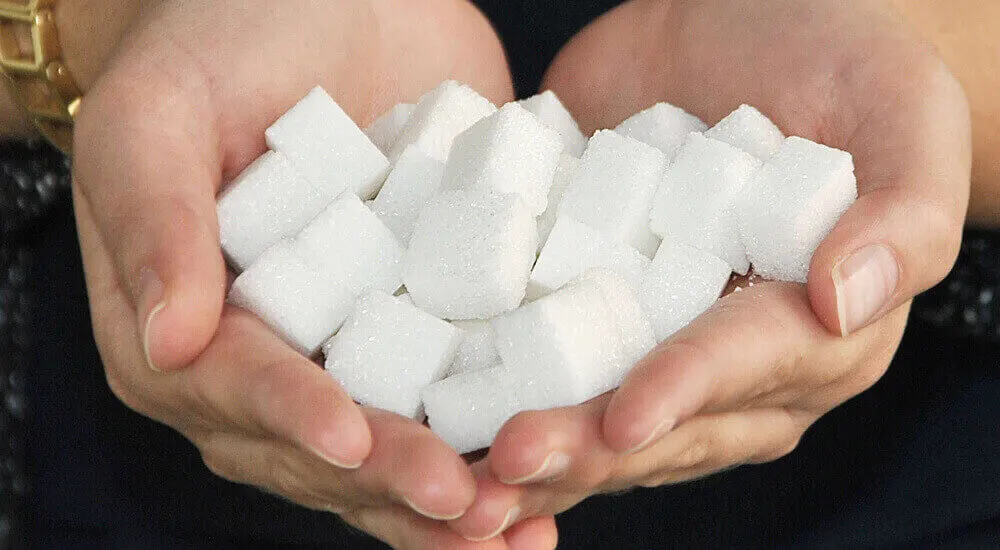
Reduce sugar consumption! Why?
Sugar substitutes are very popular with consumers. Before we talk about Stevia, let's explain where this comes from. It is actually very simple. It is now well known that sugar, when consumed regularly or in large quantities, is not exactly beneficial to health. For active athletes, the effect of sugar consumption is different. For them, sugar is usually converted into starch.
For most people, however, exercise is not part of the daily schedule - especially in increased amounts, household sugar or fructose is converted into fat. In the long run, this increases the risk of many metabolic diseases.
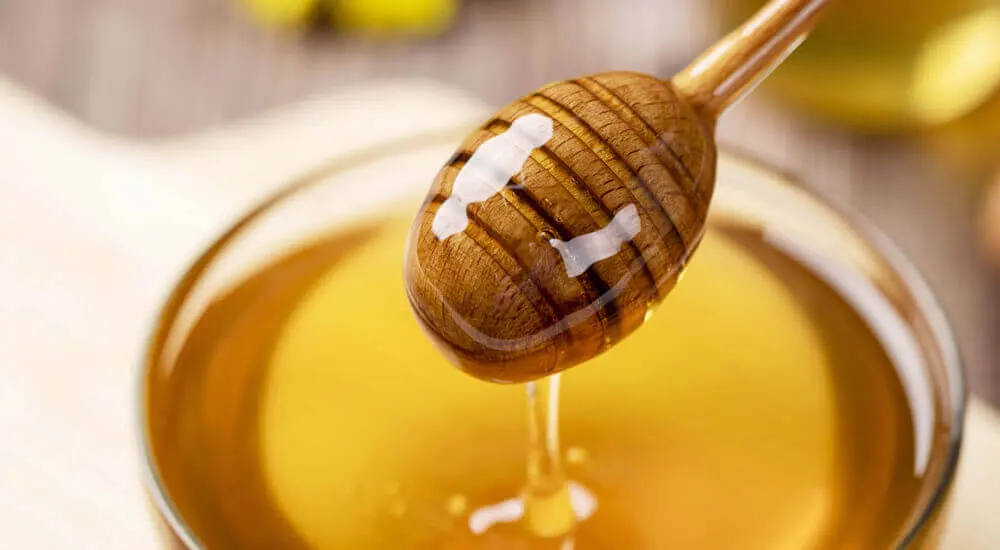
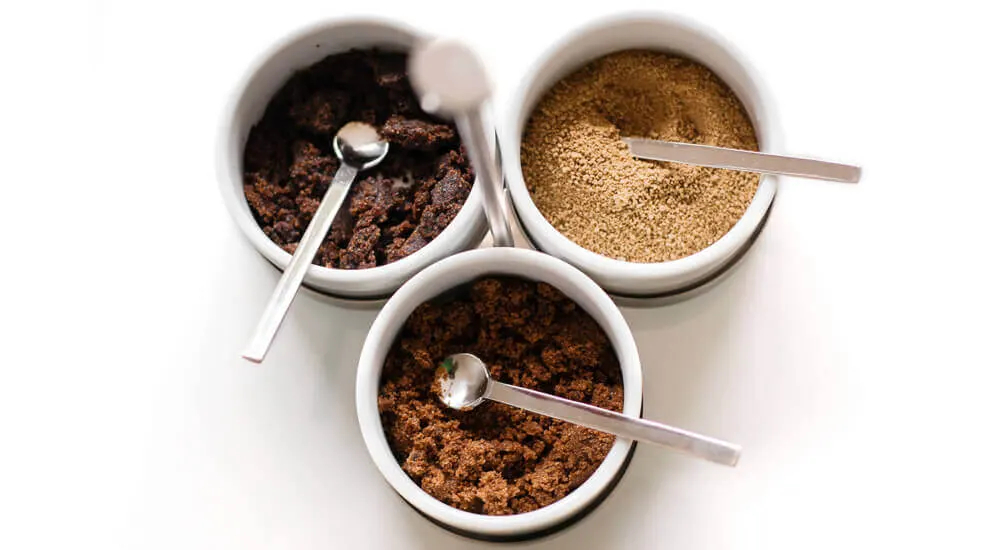
The different sugar alternatives
"Away from sugar" is the motto and towards the alternatives of the harmful household sugar. First of all, a distinction should be made between so-called sugar substitutes and the sugar substitutes or natural sweeteners.
What alternatives are there to sugar?
In the meantime, there are numerous ways to sweeten drinks and meals without the white household sugar. We give you an overview of the most popular sugar substitutes or sugar alternatives.
Reduce sugar consumption and use sugar alternatives
Maple syrup, Erythritol, honey and Xylitol are sugar substitutes.
Sugar substitutes are mostly calorie-containing sugar alternatives whose range of use and ratio are very similar to that of sugar. They include, for example, maple syrup, Erythritol, honey and Xylitol. They taste good, are very popular and usually have almost no side effects.
Sugar substitutes are usually high-calorie sugar alternatives.
According to studies, natural honey has a significantly more positive effect on blood sugar levels compared to conventional sugar. People who have problems with blood sugar fluctuations can achieve a much more stable level with honey. Maple syrup has a similar effect.
Maple syrup and honey
Maple syrup
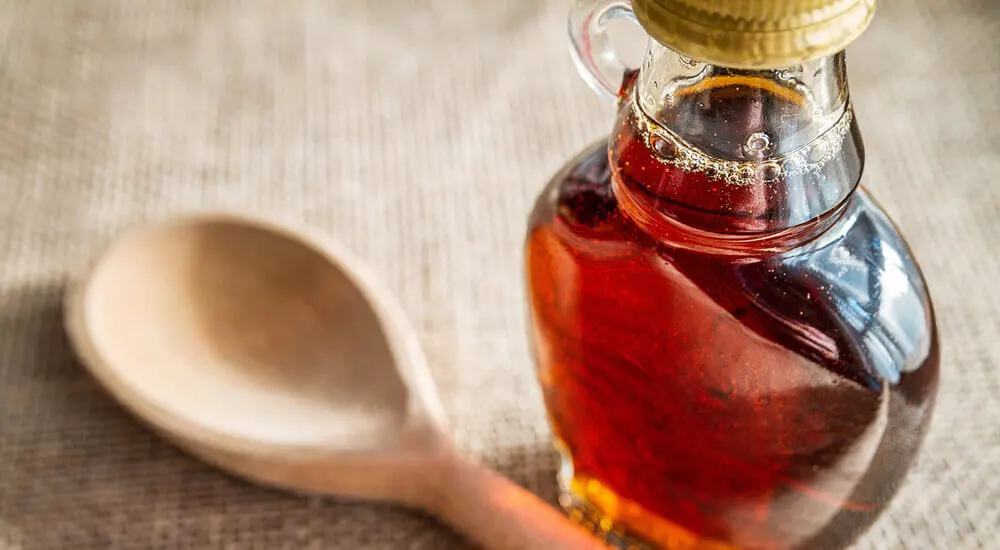

Maple syrup consists mainly of water, carbohydrates and sugar. In maple syrup, the sugar content consists of 88 to 90 % sucrose and about 11 % fructose and glucose.
Maple syrup also contains very small amounts of protein, minerals and trace elements.
Since the proportion of minerals and trace elements is very low and does not carry any weight, maple syrup can hardly be counted as a healthy food.
Maple syrup causes the blood sugar level to rise more slowly than household sugar. The reason is the lower glycaemic load of maple syrup compared to sugar. The glycaemic load is an indicator of the insulin requirement triggered by a food. Diabetics can also sweeten with maple syrup in moderation.
Maple syrup has fewer calories by weight than honey or sugar because of its high-water content.
Because it is less sweet than honey, people tend to use more maple syrup, which means they consume more calories.
In summary, maple syrup can be considered healthier than table sugar because of its composition, but only if consumed in moderation.
Honey

Buy honey from the beekeeper!
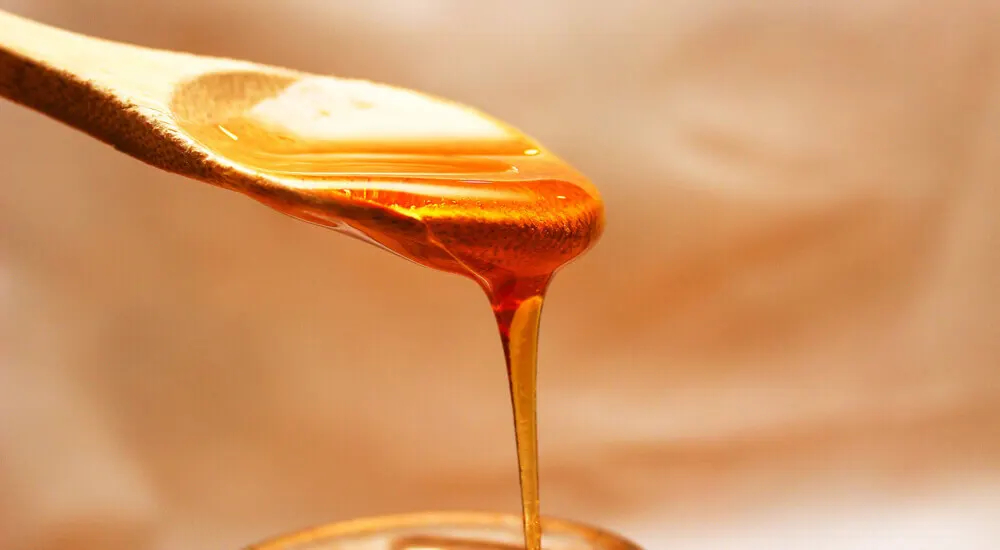
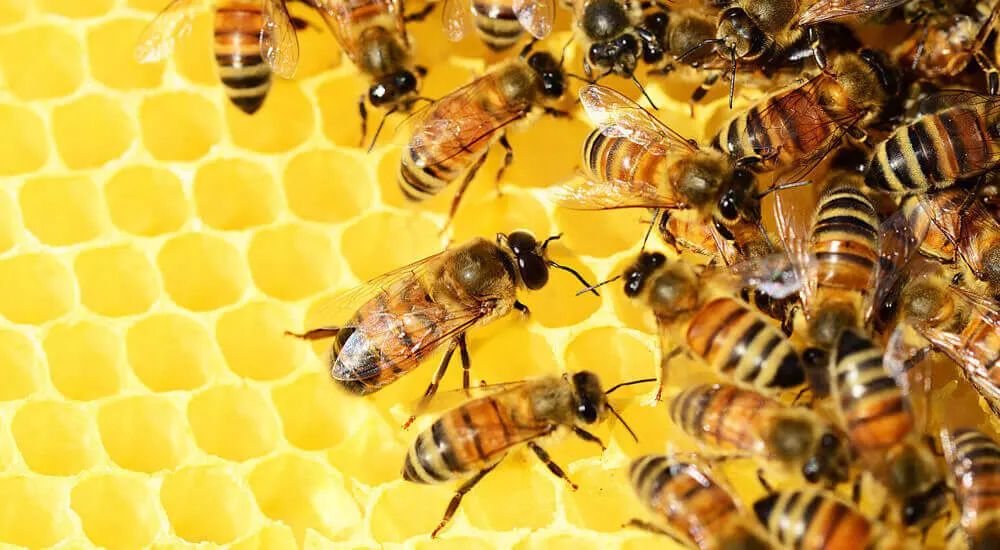
Honey (per 100 g: 306 Kcal, 75 g carbohydrates; thereof sugar: 74 g)
Honey enjoys great popularity because it can be used in so many ways. Whether in yoghurt, muesli, milk or tea - honey tastes good with almost everything. Because of its healing powers, it is also often called liquid gold.
Not only does this food contain a variety of vitamins, minerals and amino acids, but also cell-protecting antioxidants that support the cardiovascular system. Honey also has an anti-inflammatory and antibacterial effect and thus helps with sore throats, for example.
The sweetening power of honey is about 80% that of household sugar. Caution: Honey also contains both glucose and fructose. Therefore, honey can also be harmful if consumed in excess.
Nevertheless, this natural sweetener is suitable for everyday sweetening as well as for one or the other sweet, because honey, in contrast to sugar, has some positive ingredients.
However, it should be noted that some of these ingredients can be lost in foods with a temperature of more than 40°C.
In general, when buying sugar substitutes (such as honey and maple syrup), make sure that they are of good quality, as the differences are sometimes very great.
Organic honey from beekeepers, for example, is usually of a much higher quality than the cheap, mostly mixed types of honey from the supermarket.
Xylitol | birch sugar
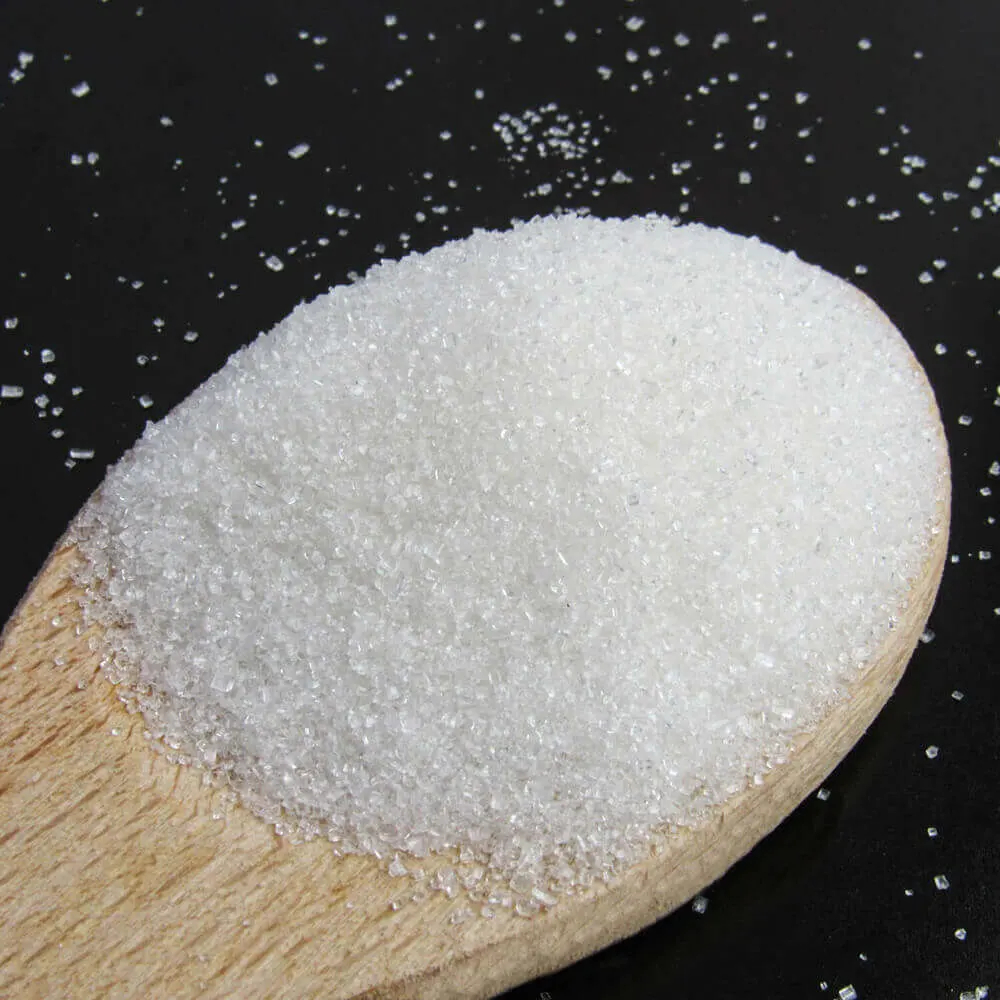
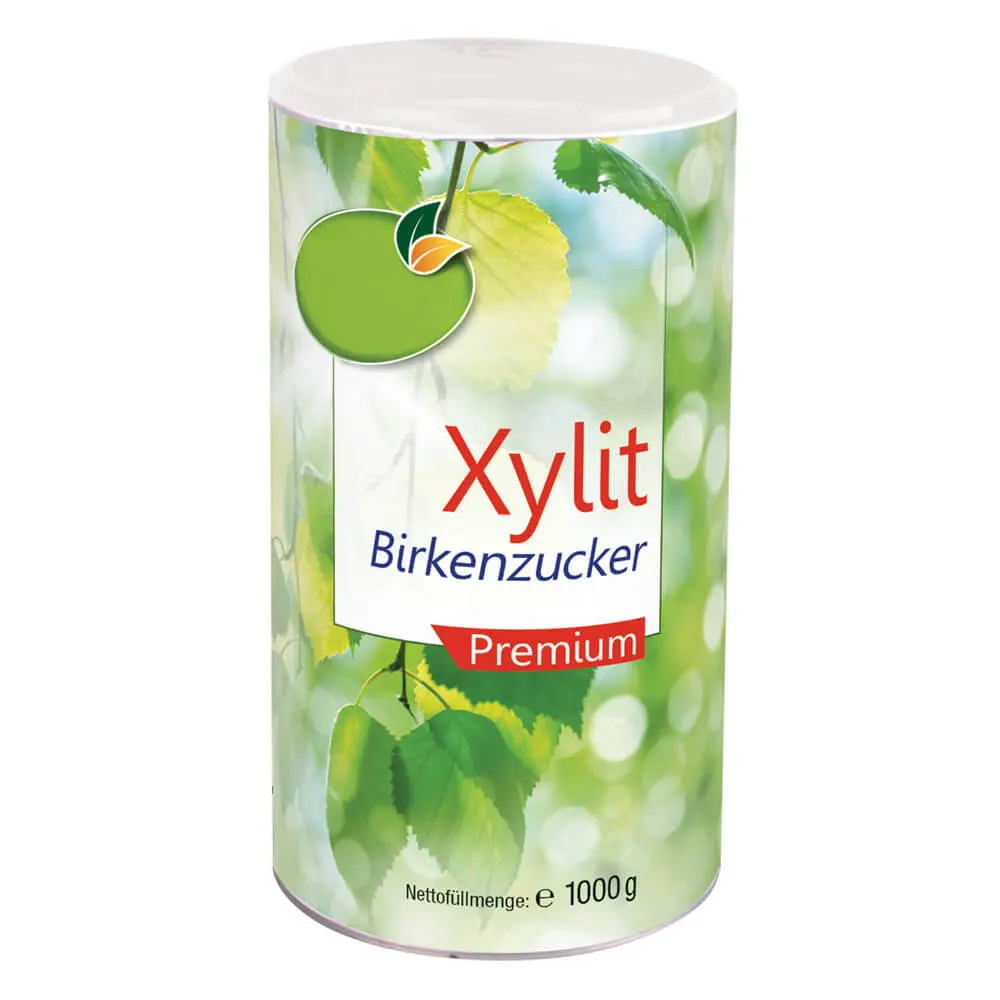
Birch sugar - Xylitol (per 100 g: 240 Kcal, 100 g carbohydrates; thereof sugar: 0 g)
As the name suggests, Xylitol or birch sugar is made from tree parts. Very often birch sugar is made from corn dextrin and rarely from birch. The extraction of this sweetener is very complex. Xylitol has the same sweetening power as sugar and is used in food and drinks as well as in baking.
Although birch sugar tastes very similar to household sugar, it has fewer calories. In addition, the sugar substitute only slightly affects the blood sugar level and has a caries-reducing and anti-inflammatory effect.
However, with all the advantages, there is also a disadvantage. Besides flatulence, Xylitol can also cause diarrhoea. As a rule, however, the body quickly gets used to Xylitol. Nevertheless, it is advisable to gradually introduce the body to the sugar substitute. Adults should not exceed the maximum daily dose of 150g.
Birch sugar ("Xylitol"), on the other hand, is not made from the Finnish birch tree, as is often assumed, but very often from maize. Organic birch sugar comes almost exclusively from China!
The calorie content of this sugar alternative is only 40% less than sugar.
Erythritol | Erythritol
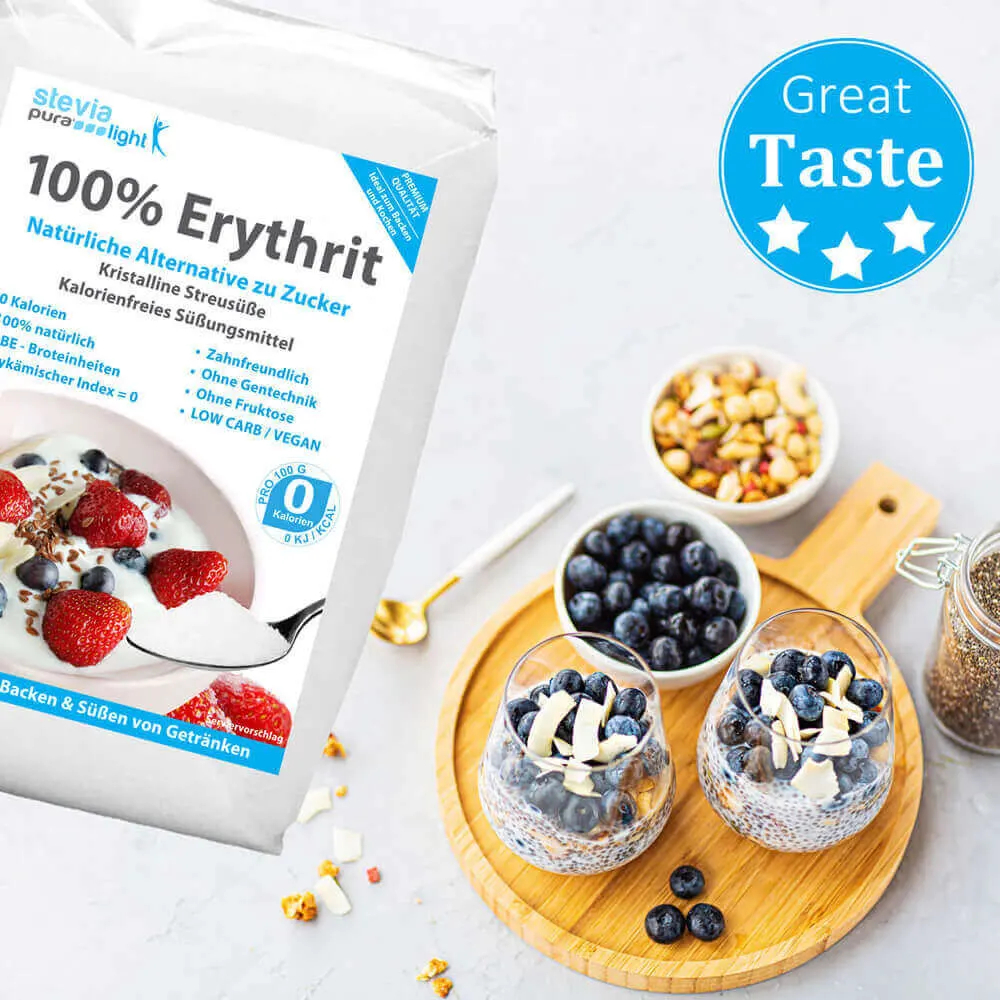
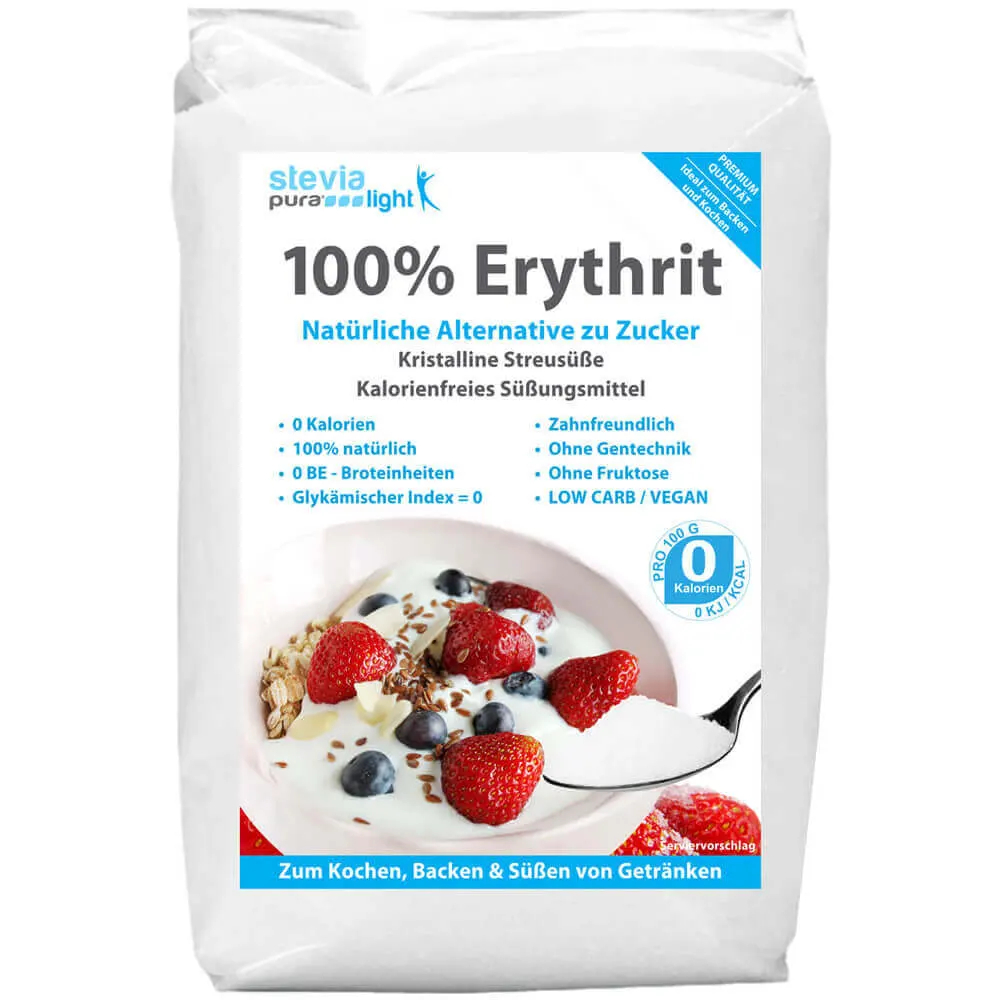
Erythritol sugar substitute is suitable for diabetics
Erythritol is another well-known sugar substitute. Erythritol occurs naturally in ripe fruits and is obtained through the fermentation of carbohydrates. Erythritol is better tolerated than other sugar alcohols and offers further advantages. With a glycaemic index of zero, Erythritol has no effect on blood sugar levels and, as a sugar substitute, has no calories. This sugar substitute is suitable for diabetics because Erythritol is metabolised independently of insulin.
Erythritol is also a good alternative to sugar for fructose intolerance because it does not affect glycogen metabolism and is free of fructose.
A healthy sugar substitute in terms of your teeth, Erythritol helps maintain tooth mineralisation. As a sprinkle sweetener mixture Erythritol and Stevia has the advantage that it can be used 1 to 1 like sugar. This makes it much cheaper to use than pure Erythritol or Xylitol.
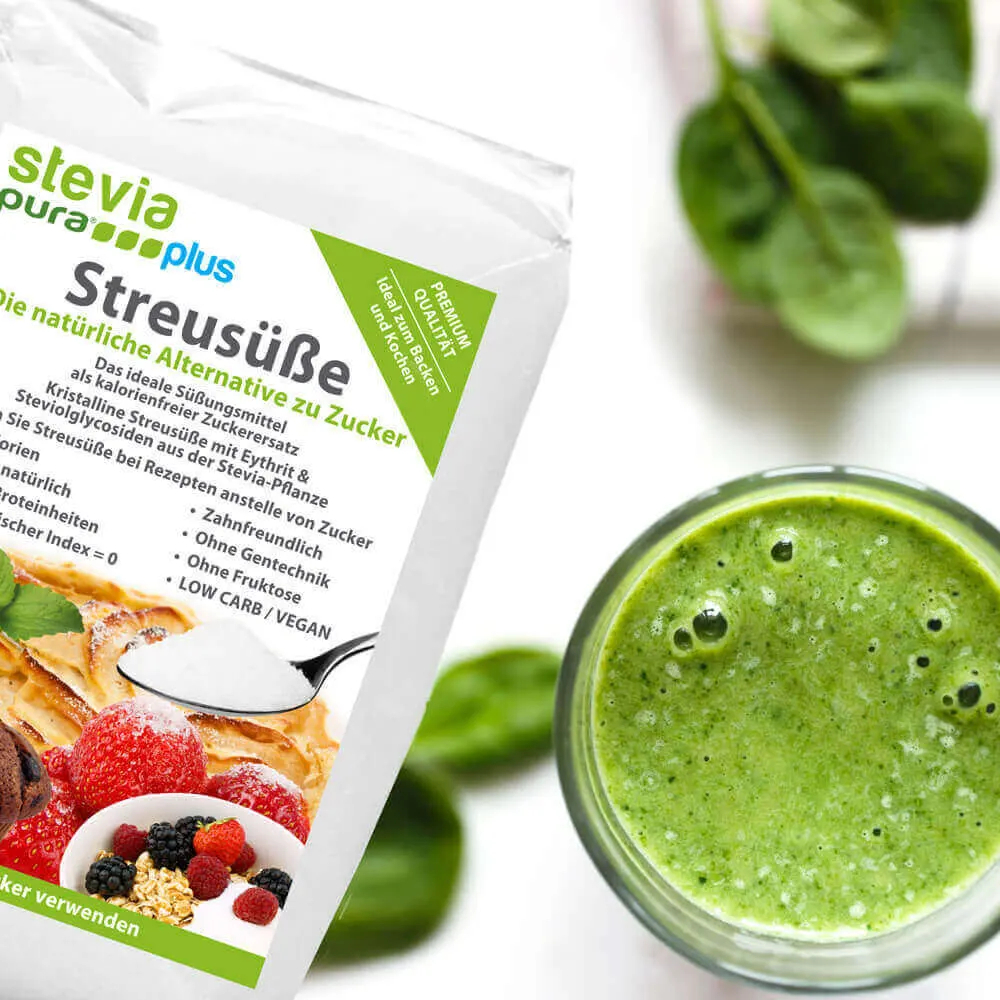
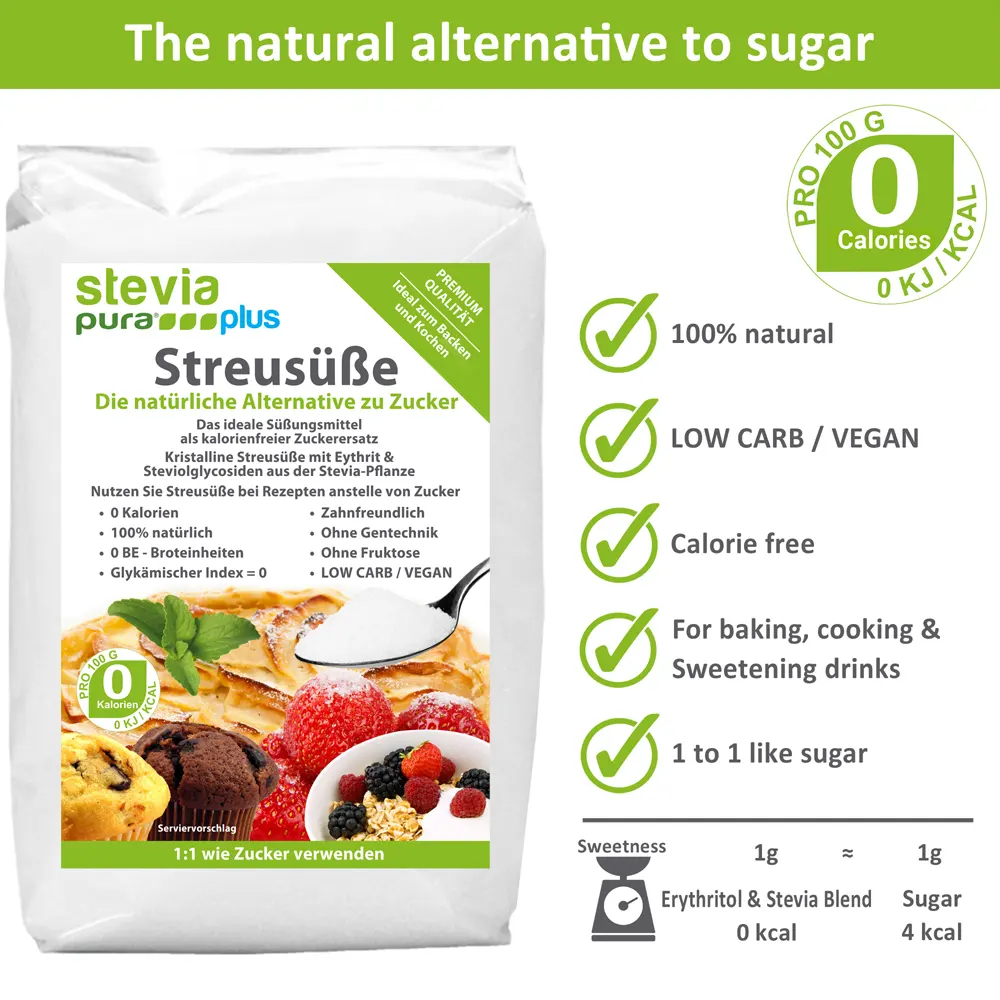
Did you know?
These sugar substitutes are often advertised as healthier than they actually are: for example, agave syrup, date syrup, coconut flower syrup! Often advertised as "superfoods", their fructose content is much higher than that of sucrose. The products consist entirely of cane sugar and have few nutrients.
Superfood is a marketing term, not a scientific one. The effect of superfoods lacks any scientific basis and in the issue of 20.10.2016, Ökotest called 21 superfoods in the test Supertox. It is better to eat a healthy balanced diet with fresh fruit and vegetables.
Why coconut blossom sugar is not healthier than household sugar

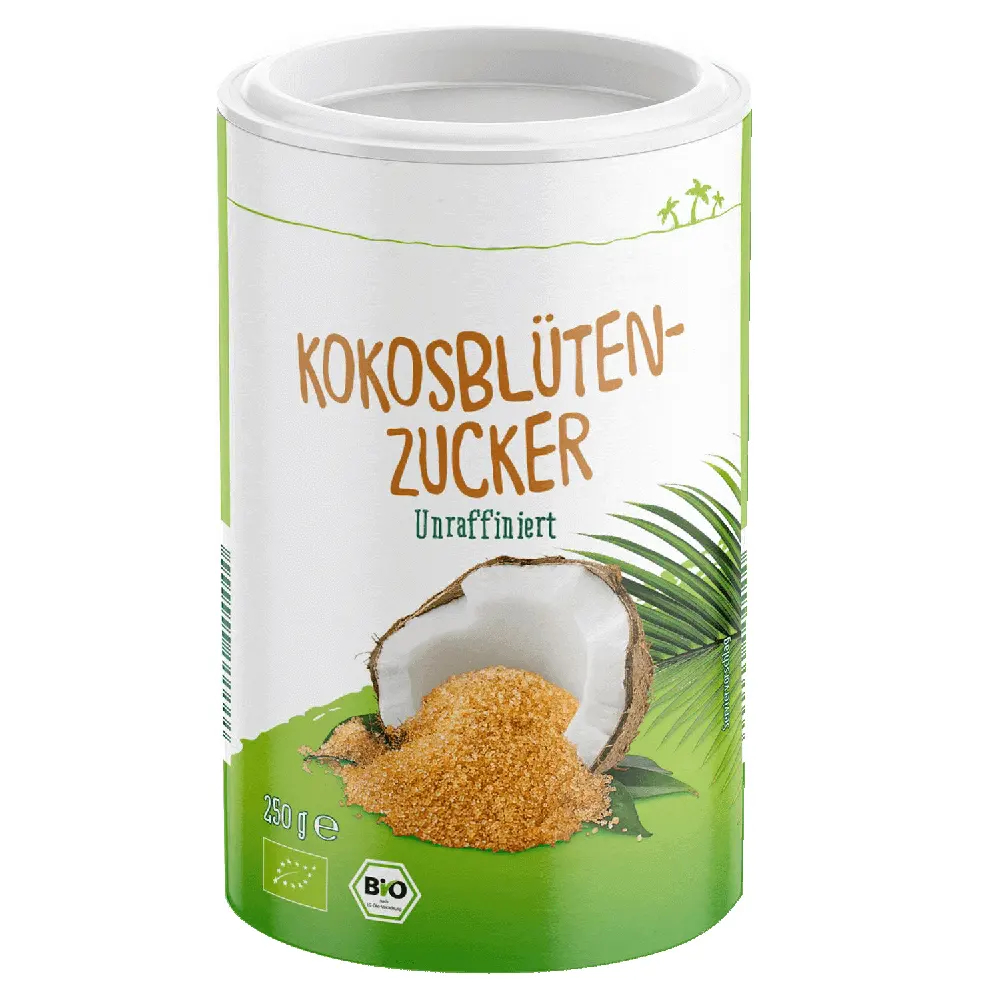
Coconut blossom sugar (per 100g: 380 Kcal, 94 g carbohydrates; of which sugar: 94 g)
This special type of sugar is extracted from coconut palm blossoms by a very complex manual process. Coconut blossom sugar contains many important antioxidants, vitamins and minerals such as magnesium, iron and zinc. The blood sugar level rises only slightly when the sweetener is consumed and the hormone insulin is also released only slowly. The blood sugar level drops just as slowly afterwards.
Coconut blossom sugar has about the same sweetening power as white household sugar. The taste of the sugar substitute is more reminiscent of caramel than of coconut itself. Coconut blossom sugar is very suitable for cooking, sweetening hot drinks and desserts.
When cooking, keep in mind that the sweetener dissolves at a very low rate. Many manufacturers of coconut blossom sugar stretch their products with cane sugar.
This is why coconut blossom sugar is not healthier than household sugar: Öko Test published this test in the ÖKO-TEST magazine April 2021.
So, when buying, pay attention to the purity of the sugar. Although coconut blossom sugar scores well in terms of ingredients, the calorie content is comparable to that of household sugar.
Sweeteners: Aspartame, Clyclamate Aspartame, Sucralose, Acesulfame-K, Saccharin and Stevia
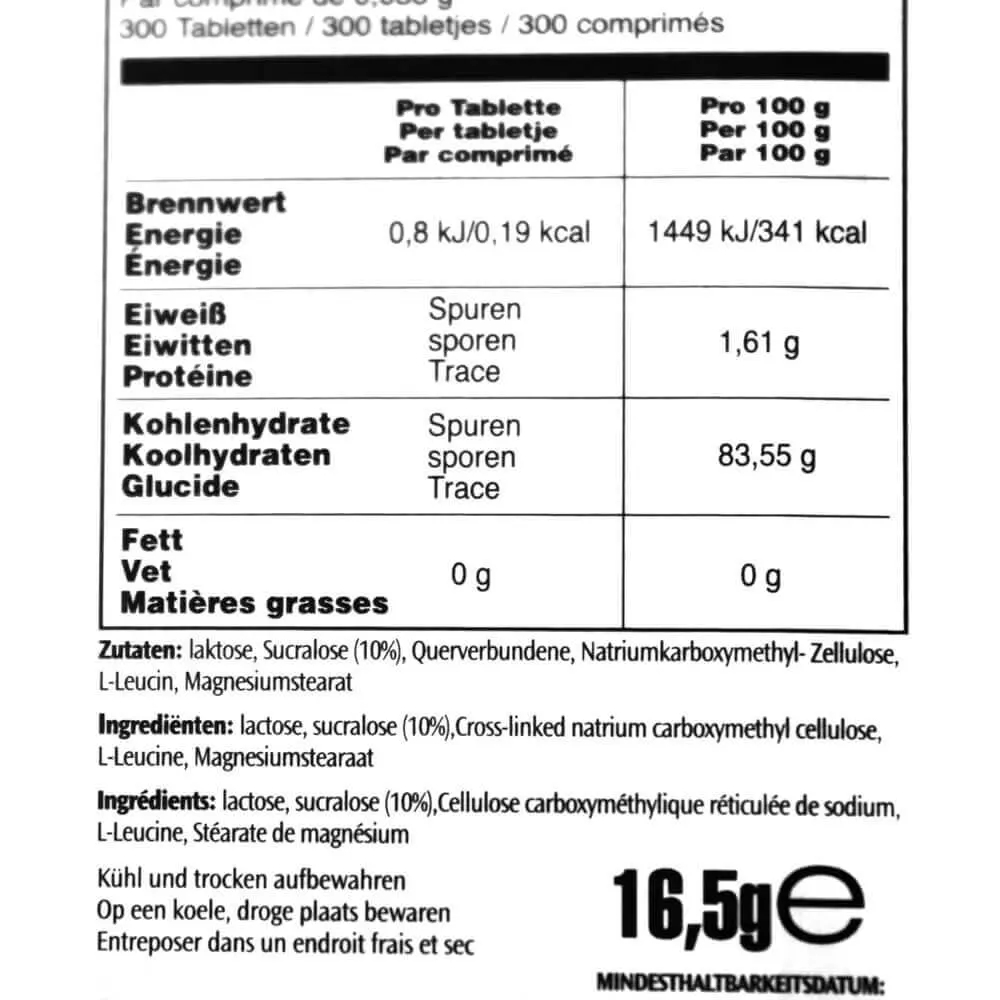
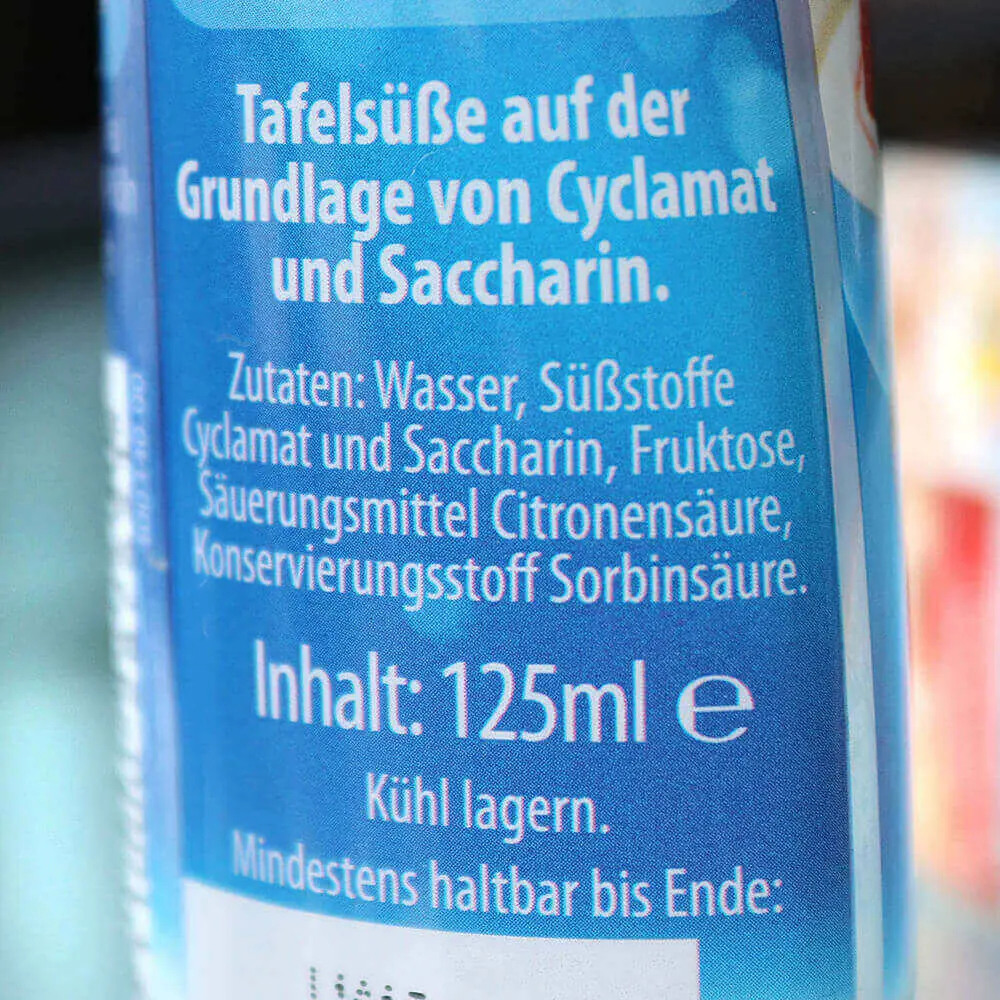
Sweeteners and sweetening agents have no calories and have a much higher sweetening power than sugar. They are therefore also called intense sweeteners.
A distinction is made between natural sweeteners that occur naturally and artificial sweeteners that are produced synthetically.
However, experience has shown that artificially produced sweeteners such as aspartame, clyclamate, sucralose, acesulfame-K and saccharin always cause side effects in the long run because the human body is not used to them from nature.
At the same time, many of them have not been fully investigated to rule out possible long-term effects and to recommend them without reservation. Each consumer should decide on consumption for themselves.
Artificial sweeteners with high sweetening power include: Aspartame, Acesulfame K, Cyclamate, Saccharin and Sucralose.
Stevia the sweetener of natural origin
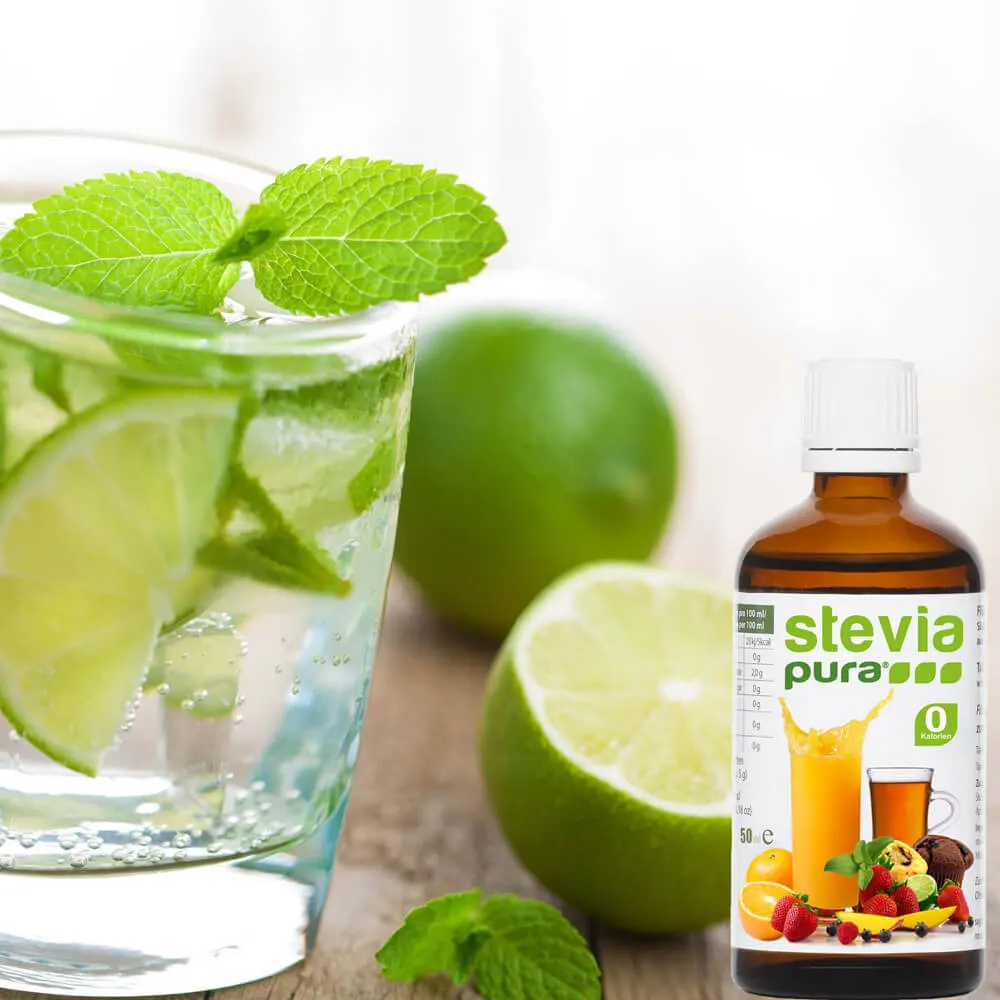
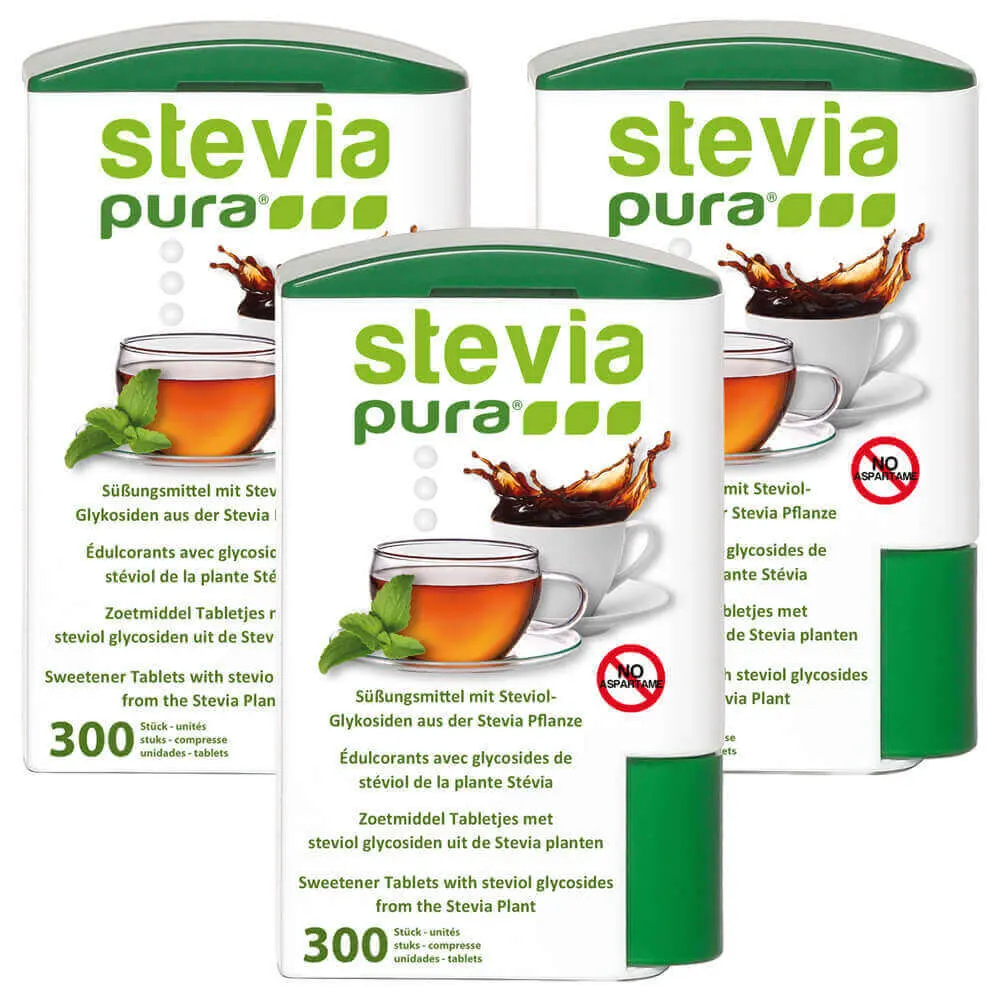
Stevia (per 100 g: 0 Kcal, 0 g carbohydrates)
The sweetener Stevia is produced naturally by the plant of the same name.
Its sweetening power is up to 450 times stronger than that of industrially produced household sugar. In contrast to the latter, however, Stevia is particularly tooth-friendly. It reduces the likelihood of tooth decay.
For diabetics in particular, it is also interesting that the blood sugar level is not affected by Stevia. The sugar substitute can be used to sweeten drinks and muesli as well as to flavour hot and cold dishes.
Stevia is also excellent for baking. It is important to note that the natural sweetener does not have the same baking properties as household sugar.
If the dosage is too high or the product is of poor quality, Stevia can have a bitter aftertaste.
Some manufacturers supplement their products with cheap fillers or even sugar. Therefore, when buying a Stevia product, it is important to pay attention to the ingredients.
Fruits: Muesli or porridge can be wonderfully sweetened with fresh fruit.
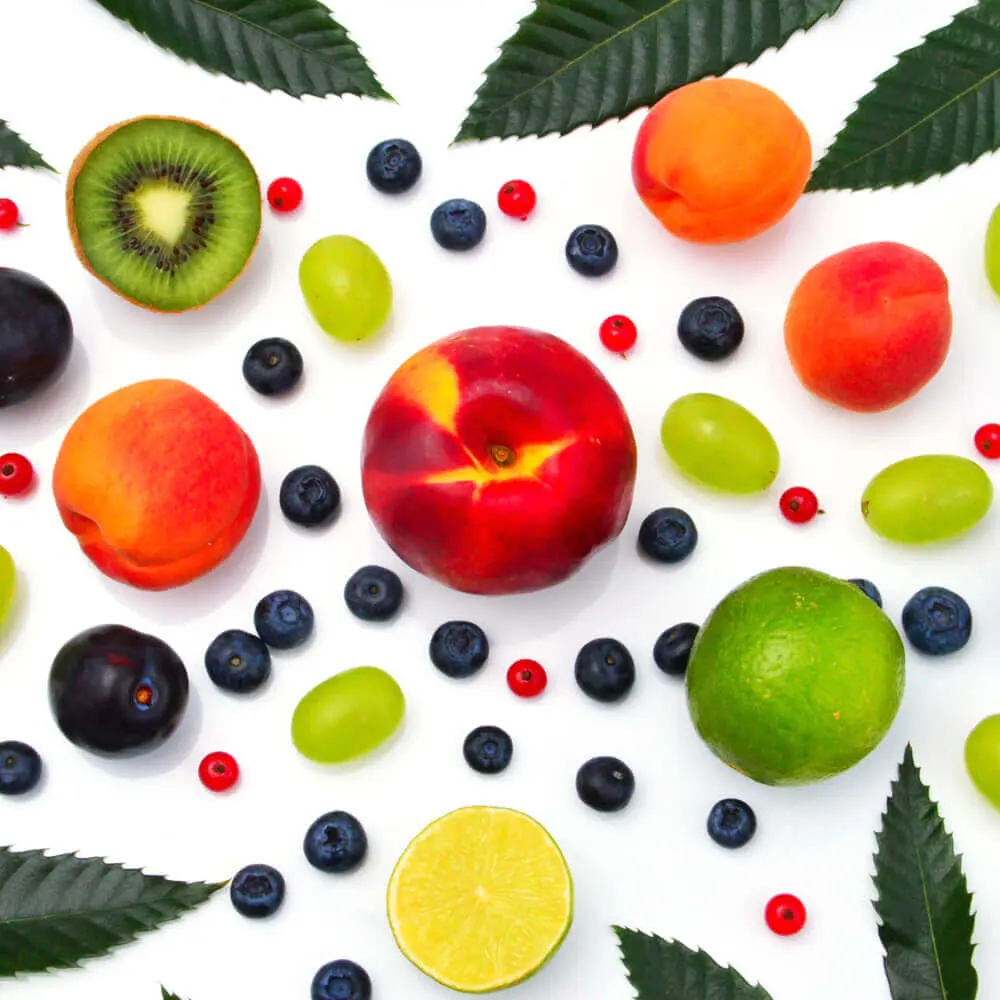
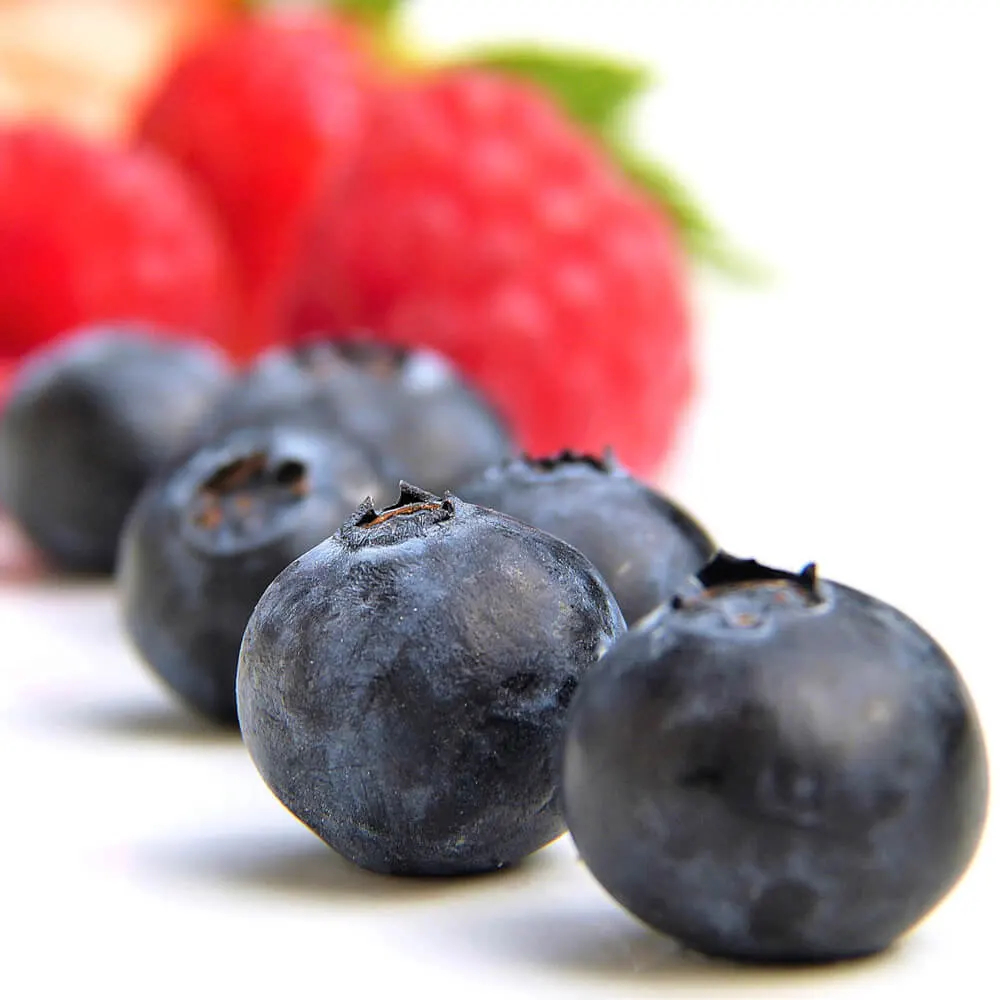
Ripe fruits are also suitable for sweetening. Bananas, for example, provide not only the necessary sweetness but also important minerals such as potassium or magnesium as well as a large amount of energy. A banana has about 90 kcal and 23 grams of carbohydrates per 100 grams.
Dates, which are particularly easy to store, are available in a wide range of varieties. For example, there are very sweet or dry dates, but also some with a caramel flavour. They can be used in coffee, tea, cakes or desserts.
Dates also contain important ingredients. These include vitamins, antioxidants, fibre and minerals.
However, with a calorific value of 280 Kcal per 100 grams, dates are a rather high-calorie sugar alternative. There are about 75 grams of carbohydrates per 100 grams of dates. To sweeten with the small fruits, you can, for example, crush them with a fork or puree them with a blender and then mix them with the food.
Conclusion
Eating cakes, sweetened teas or desserts is also compatible with a healthy diet. The only thing that matters is the choice of sugar substitute. There is a wide range of plant-based and natural sweeteners, some of which even contain healthy ingredients and have a health-promoting effect.
It is therefore advantageous to look into the individual sweeteners before completely giving up sweets and other treats.

 German
German Dutch
Dutch French
French Italian
Italian Portuguese
Portuguese Spanish
Spanish
